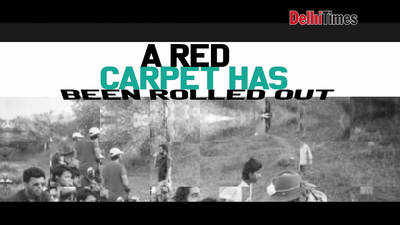- News
- entertainment
- hindi
- bollywood
- Quick permissions, visas and customs clearance: A red carpet has been rolled out for foreign films in India
Trending
This story is from October 13, 2019
Quick permissions, visas and customs clearance: A red carpet has been rolled out for foreign films in India
Capturing ‘the flavour of India’ has been one of the main agendas of most foreign films and TV shows shot in India. However, till around a couple of years back, delays in getting visas for foreign crews, the red tape stretching the permissions process to three-six months sometimes, and hassles in the temporary import of shooting equipment, among other issues, meant very few foreign projects were actually shot here.

Christopher Nolan shot for a week for his upcoming film in Mumbai last month. The India producer of the film said that unlike earlier, getting permissions was a smooth process and they even got permission to shoot aerial shots very quickly
Capturing ‘the flavour of India’ has been one of the main agendas of most foreign films and TV shows shot in India. However, till around a couple of years back, delays in getting visas for foreign crews, the red tape stretching the permissions process to three-six months sometimes, and hassles in the temporary import of shooting equipment, among other issues, meant very few foreign projects were actually shot here.The India producers of international projects say that whenever the script has an India connect, foreign filmmakers want to shoot in India. However, when shooing here seemed impossible, the makers would either scrap the India portion of the shoot or recreate it in another country.
But now, with an easier permissions process, thanks to the Film Facilitation Office (FFO), and a special visa category for foreign crews filming in India, the number of projects being shot in the country has gone up. From three-four projects in a year, the number has gone up to over 10 projects in 2019 alone till now, including Christopher Nolan’s 'Tenet', which he shot in Mumbai last month.
Currently, five major foreign projects are being shot in different parts of the country. Line producers and India producers of foreign projects tell us what has changed in the permissions process and what more can be done to attract foreign filmmakers to India.

A foreign filmmaker, on an average, has to get over 31 licences to shoot a film in India. However, in the last four years, the I&B ministry, through FFO, has worked to reduce the time taken to procure permits for foreign crews.
Pravesh Sahni, India producer of films like 'Slumdog Millionaire', 'Lion', and 'Hotel Mumbai', says, “The FFO has smoothened the process for international projects and it has helped more international filmmakers shoot in India. After getting permits to shoot in India, we have to apply to local agencies for shooting at that particular location. The facilitators and infrastructure scenario is improving in India. These days, the permits are being issued faster. In the last couple of years, they’ve brought tremendous change in the filming for international films in India.”
 Chris Hemsworth shot for this film in Mumbai and Ahmedabad last year, and will be back later this month for some patchwork shoot
Chris Hemsworth shot for this film in Mumbai and Ahmedabad last year, and will be back later this month for some patchwork shoot
Last month when Christopher Nolan came to shoot his upcoming film 'Tenet' in Mumbai, he got the permission within a week. Dileep Singh Rathore, the India producer of 'Tenet', says, “I recently completed a seven-day schedule of Christopher Nolan’s 'Tenet' in India, and it was only possible because we got the permissions in time. As someone who has faced a lot of trouble in getting permissions in the past, now, it feels like a red carpet has been rolled out for foreign projects in India. I have four other international projects in the pipeline to shoot in India, but I can’t disclose their names.”
As foreign filmmakers often want to capture aerial scenes, a separate department has been introduced to cater to these requests. The Directorate General of Civil Aviation (DGCA) provides permission for aerial shootings in the country. Dileep Singh Rathore adds, “A few years back, to get permission to shoot a helicopter scene for Nolan’s 'The Dark Knight Rises' (which had some scene shot in Jodhpur), I had applied five months in advance, but I never got permission. But for Tenet, we got the permission to use a helicopter very quickly.”
 Dimple Kapadia shoot for Christopher Nolan’s upcoming film, 'Tenet', in Mumbai
Dimple Kapadia shoot for Christopher Nolan’s upcoming film, 'Tenet', in Mumbai
No visa issues for foreign crews now
In 2017, the I&B ministry consulted the MHA and the MEA, and introduced a special visa category for foreign filmmakers.
Alan McAlex, the India producer of two international projects, one being shot in UP and another film scheduled for shoot in Ahmedabad next month, says, “Quick visa clearances for the foreign crews is one of the reasons why more foreign filmmakers are coming to shoot in India. For shooting in India, foreign filmmakers have to get clearance from the I&B Ministry. The ministry officials coordinate with the Indian embassies abroad, and help in getting visa clearances faster.”
For foreign filmmakers, getting the permission to shoot in India used to take five-six months, which has now reduced to three-four weeks.
 The crew shooting a scene of Garth Davis’ 'Lion', starring Dev Patel, in India
The crew shooting a scene of Garth Davis’ 'Lion', starring Dev Patel, in India
Temporary import of filming equipment at customs used to be a huge pain
For foreign filmmakers, the biggest hurdle to shooting in India is customs clearance because they have to import film shooting equipment temporarily. Dileep Singh Rathore says, “For Tenet, we had to bring IMAX cameras and other equipment as filmmaking process abroad is more advanced. When foreign filmmakers bring equipment to India they have to spend a lot of time in getting customs clearance. While this time the process was very smooth, the temporary import of filming equipment has been a big problem area for us.”
 Several scenes of Anthony Maras’ 'Hotel Mumbai' were shot in the country
Several scenes of Anthony Maras’ 'Hotel Mumbai' were shot in the country
‘ASI, DGCA, Railways can further improve permission process’
When we asked India producers of foreign projects about the departments where the permissions process can be improved, the most common reply was the airports, the ASI and the railways. Pravesh, who has also worked on 'Homeland', and is currently working on two international shows, says, “We have been discussing the timelines of shoots with the ASI. The official time is from 6am, but to capture the sunrise at 6am, the crew needs to set up at 4am. Similarly, for airport shoots, the permissions process takes weeks to months. Another problem that we face is that multiple permissions are needed from railways because it is divided into different zones – a centralised system will help filmmakers.”
To shoot at a railway station or on the railway tracks, permission is needed from the zone the station or the track falls in. For some areas, permission is needed from two zones. For instance, at Howrah Junction Railway Station, platform 1-9 come under one zone, and 10-18 in other zone, and filmmakers need to take permission from both the zones, which doubles the fee. During the shooting of 'Lion' at Khandwa, the producers had to get permission from two zones. A security clearance from the Railway Board in Delhi is also needed.
 Several scenes of Gurinder Chadha’s TV series, 'Beecham House', were shot in the country
Several scenes of Gurinder Chadha’s TV series, 'Beecham House', were shot in the country
Talking about incentives, Pravesh Sahni says, “Countries like Malaysia, Thailand, Singapore and Sri Lanka offer incentives, but we don’t have as many incentives in India. I have been discussing it with the I&B officials that if a filmmaker is spending over Rs 2 million in India, he/she should be offered some incentive to shoot here.”
The production houses say that incentives also help in attracting a number of independent foreign filmmakers who submit their work to film festivals, and it can position India better on the map of shooting locations.
 Gurinder Chadha’s 'Viceroy’s House' was shot in several locations in India, including Delhi
Gurinder Chadha’s 'Viceroy’s House' was shot in several locations in India, including Delhi
Is India a destination for foreign filmmakers?
Alan McAlex says, “When a foreign filmmaker decides to shoot in India, it is because the script demands it. We can definitely say that more foreign filmmakers are interested in filming in India, but India is still not a shooting destination. One of the reasons is that international filmmakers won’t get extras here. They can easily go to East Europe and replicate New York there, and they will get a crowd of 2000 extras, but if they want to do it in India, they’ll have to bring those extras along with them.”
 In 2012, the Ministry of Railways did not give permission to shoot an action sequence on top of a moving train for the James Bond movie, 'Skyfall', because they felt that India would be shown in a poor light. The 2018 release, 'Mission: Impossible - Fallout', the sixth in the series, which opens with a scene in Kashmir and ends with it too, didn’t get the required permissions to shoot in the valley. So director Christopher McQuarrie created Kashmir in New Zealand. He was quoted as saying, “It was a pretty crazy sequence. People were very nervous about us coming there and doing that. So while we were shooting in New Zealand, we still had this (feel)... We liked the flavour of India, so (somehow) we managed to put it in (the film).” Line producers tell us that for every film which doesn’t get permission to shoot in India, or its shooting gets disrupted, it stops five other filmmakers from shooting in the country.
In 2012, the Ministry of Railways did not give permission to shoot an action sequence on top of a moving train for the James Bond movie, 'Skyfall', because they felt that India would be shown in a poor light. The 2018 release, 'Mission: Impossible - Fallout', the sixth in the series, which opens with a scene in Kashmir and ends with it too, didn’t get the required permissions to shoot in the valley. So director Christopher McQuarrie created Kashmir in New Zealand. He was quoted as saying, “It was a pretty crazy sequence. People were very nervous about us coming there and doing that. So while we were shooting in New Zealand, we still had this (feel)... We liked the flavour of India, so (somehow) we managed to put it in (the film).” Line producers tell us that for every film which doesn’t get permission to shoot in India, or its shooting gets disrupted, it stops five other filmmakers from shooting in the country.
 Myriad clearances would often scare, confuse, or simply tire out international filmmakers looking to work in India. To remove the red tape involved in obtaining filming permits in India, the Film Facilitation Office (FFO), operated by the National Film Development Corporation (NFDC), which is the single window clearance system for international film shoots in India, subsequently went online. In 2017, at the Cannes Film Festival, India specially focused on promoting film tourism and encouraging international studios to shoot in the country.
Myriad clearances would often scare, confuse, or simply tire out international filmmakers looking to work in India. To remove the red tape involved in obtaining filming permits in India, the Film Facilitation Office (FFO), operated by the National Film Development Corporation (NFDC), which is the single window clearance system for international film shoots in India, subsequently went online. In 2017, at the Cannes Film Festival, India specially focused on promoting film tourism and encouraging international studios to shoot in the country.
But now, with an easier permissions process, thanks to the Film Facilitation Office (FFO), and a special visa category for foreign crews filming in India, the number of projects being shot in the country has gone up. From three-four projects in a year, the number has gone up to over 10 projects in 2019 alone till now, including Christopher Nolan’s 'Tenet', which he shot in Mumbai last month.
Currently, five major foreign projects are being shot in different parts of the country. Line producers and India producers of foreign projects tell us what has changed in the permissions process and what more can be done to attract foreign filmmakers to India.

Christopher Nolan’s 'Tenet' got shooting permissions in a week
A foreign filmmaker, on an average, has to get over 31 licences to shoot a film in India. However, in the last four years, the I&B ministry, through FFO, has worked to reduce the time taken to procure permits for foreign crews.
Pravesh Sahni, India producer of films like 'Slumdog Millionaire', 'Lion', and 'Hotel Mumbai', says, “The FFO has smoothened the process for international projects and it has helped more international filmmakers shoot in India. After getting permits to shoot in India, we have to apply to local agencies for shooting at that particular location. The facilitators and infrastructure scenario is improving in India. These days, the permits are being issued faster. In the last couple of years, they’ve brought tremendous change in the filming for international films in India.”

Last month when Christopher Nolan came to shoot his upcoming film 'Tenet' in Mumbai, he got the permission within a week. Dileep Singh Rathore, the India producer of 'Tenet', says, “I recently completed a seven-day schedule of Christopher Nolan’s 'Tenet' in India, and it was only possible because we got the permissions in time. As someone who has faced a lot of trouble in getting permissions in the past, now, it feels like a red carpet has been rolled out for foreign projects in India. I have four other international projects in the pipeline to shoot in India, but I can’t disclose their names.”
As foreign filmmakers often want to capture aerial scenes, a separate department has been introduced to cater to these requests. The Directorate General of Civil Aviation (DGCA) provides permission for aerial shootings in the country. Dileep Singh Rathore adds, “A few years back, to get permission to shoot a helicopter scene for Nolan’s 'The Dark Knight Rises' (which had some scene shot in Jodhpur), I had applied five months in advance, but I never got permission. But for Tenet, we got the permission to use a helicopter very quickly.”

Dimple Kapadia shoot for Christopher Nolan’s upcoming film, Tenet, in Mumbai
No visa issues for foreign crews now
In 2017, the I&B ministry consulted the MHA and the MEA, and introduced a special visa category for foreign filmmakers.
Alan McAlex, the India producer of two international projects, one being shot in UP and another film scheduled for shoot in Ahmedabad next month, says, “Quick visa clearances for the foreign crews is one of the reasons why more foreign filmmakers are coming to shoot in India. For shooting in India, foreign filmmakers have to get clearance from the I&B Ministry. The ministry officials coordinate with the Indian embassies abroad, and help in getting visa clearances faster.”
For foreign filmmakers, getting the permission to shoot in India used to take five-six months, which has now reduced to three-four weeks.

Temporary import of filming equipment at customs used to be a huge pain
For foreign filmmakers, the biggest hurdle to shooting in India is customs clearance because they have to import film shooting equipment temporarily. Dileep Singh Rathore says, “For Tenet, we had to bring IMAX cameras and other equipment as filmmaking process abroad is more advanced. When foreign filmmakers bring equipment to India they have to spend a lot of time in getting customs clearance. While this time the process was very smooth, the temporary import of filming equipment has been a big problem area for us.”

Several scenes of Anthony Maras’ Hotel Mumbai were shot in the country
‘ASI, DGCA, Railways can further improve permission process’
When we asked India producers of foreign projects about the departments where the permissions process can be improved, the most common reply was the airports, the ASI and the railways. Pravesh, who has also worked on 'Homeland', and is currently working on two international shows, says, “We have been discussing the timelines of shoots with the ASI. The official time is from 6am, but to capture the sunrise at 6am, the crew needs to set up at 4am. Similarly, for airport shoots, the permissions process takes weeks to months. Another problem that we face is that multiple permissions are needed from railways because it is divided into different zones – a centralised system will help filmmakers.”
To shoot at a railway station or on the railway tracks, permission is needed from the zone the station or the track falls in. For some areas, permission is needed from two zones. For instance, at Howrah Junction Railway Station, platform 1-9 come under one zone, and 10-18 in other zone, and filmmakers need to take permission from both the zones, which doubles the fee. During the shooting of 'Lion' at Khandwa, the producers had to get permission from two zones. A security clearance from the Railway Board in Delhi is also needed.

Several scenes of Gurinder Chadha’s TV series, Beecham House, were shot in the country
Talking about incentives, Pravesh Sahni says, “Countries like Malaysia, Thailand, Singapore and Sri Lanka offer incentives, but we don’t have as many incentives in India. I have been discussing it with the I&B officials that if a filmmaker is spending over Rs 2 million in India, he/she should be offered some incentive to shoot here.”
The production houses say that incentives also help in attracting a number of independent foreign filmmakers who submit their work to film festivals, and it can position India better on the map of shooting locations.

Gurinder Chadha’s Viceroy’s House was shot in several locations in India, including Delhi
Is India a destination for foreign filmmakers?
Alan McAlex says, “When a foreign filmmaker decides to shoot in India, it is because the script demands it. We can definitely say that more foreign filmmakers are interested in filming in India, but India is still not a shooting destination. One of the reasons is that international filmmakers won’t get extras here. They can easily go to East Europe and replicate New York there, and they will get a crowd of 2000 extras, but if they want to do it in India, they’ll have to bring those extras along with them.”


End of Article
FOLLOW US ON SOCIAL MEDIA








